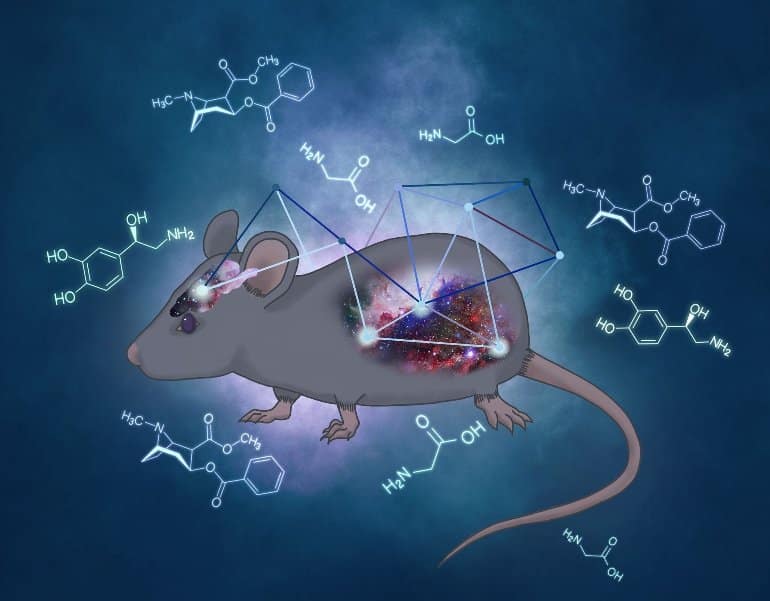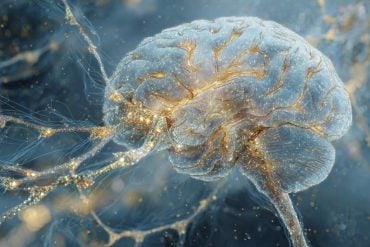Summary: Cocaine use supports the growth of γ-proteobacteria, a common gut bacteria that consume glycine. As glycine levels become depleted mouse models exhibit a higher response to cocaine with abnormal behaviors including increased drug-induced locomotion and drug-seeking behaviors.
Source: Cell Press
Common gut bacteria can enhance the effects of cocaine in mice, researchers report November 1 in the journal Cell Host & Microbe.
Their study demonstrates how cocaine use supports the growth of the bacteria, which in turn eat up a chemical, glycine, that contributes to normal brain function.
As levels of glycine become depleted, mice exhibit a higher response to the drug with behavior abnormalities, such as significantly increasing drug-induced locomotion and seeking behaviors.
Additionally, by supplementing glycine back systemically or using a genetically modified bacteria that cannot use glycine, the response of the mice to cocaine falls back to normal levels, demonstrating that this amino acid can act as an addiction-like behavior mediator in animal models.
“I was interested in the gut-brain axis, and I found it very new and exciting,” says first author Santiago Cuesta a neuroscientist at the University of Wisconsin School of Medicine and Public Health.
Cuesta and colleagues found that when cocaine enters the gut of the mice, it triggers the activation of the QseC protein that aids in the growth of γ-proteobacteria, such as E. coli. These bacteria, fueled by glycine, outcompete the normal gut bacteria that already exist in our digestive tracks, taking up most of the space and resources.
“The gut bacteria are consuming all of the glycine and the levels are decreasing systemically and in the brain,” says senior author Vanessa Sperandio, a microbiologist from the University of Wisconsin School of Medicine and Public Health.

“It seems changing glycine overall is impacting the glutamatergic synapses that make the animals more prone to develop addiction.”
“Usually, for neuroscience behaviors, people are not thinking about controlling the microbiota, and microbiota studies usually don’t measure behaviors, but here we show they’re connected” says Cuesta. “Our microbiome can actually modulate psychiatric or brain-related behaviors.”
“I think the bridging of these communities is what’s going to move the field forward, advancing beyond correlations towards causations for the different types of psychiatric disorders,” says Sperandio.
About this addiction and microbiome research news
Author: Press Office
Source: Cell Press
Contact: Press Office – Cell Press
Image: The image is credited to Florencia Cerchiara, instagram.com/florecer.creative
Original Research: Open access.
“Gut colonization by Proteobacteria alters host metabolism and modulates cocaine neurobehavioral responses” by Vanessa Sperandio et al. Cell Host and Microbe
Abstract
Gut colonization by Proteobacteria alters host metabolism and modulates cocaine neurobehavioral responses
Highlights
- Cocaine raises gut norepinephrine levels facilitating Proteobacteria colonization
- Proteobacteria colonization depletes glycine in gut, blood, and CSF in mice
- Glycine depletion alters cocaine-induced neuroplasticity and drug responses
- Systemic or bacteria-mediated glycine replenishment restores cocaine responses
Summary
Gut-microbiota membership is associated with diverse neuropsychological outcomes, including substance use disorders (SUDs). Here, we use mice colonized with Citrobacter rodentium or the human γ-Proteobacteria commensal Escherichia coli HS as a model to examine the mechanistic interactions between gut microbes and host responses to cocaine.
We find that cocaine exposure increases intestinal norepinephrine levels that are sensed through the bacterial adrenergic receptor QseC to promote intestinal colonization of γ-Proteobacteria.
Colonized mice show enhanced host cocaine-induced behaviors. The neuroactive metabolite glycine, a bacterial nitrogen source, is depleted in the gut and cerebrospinal fluid of colonized mice.
Systemic glycine repletion reversed, and γ-Proteobacteria mutated for glycine uptake did not alter the host response to cocaine. γ-Proteobacteria modulated glycine levels are linked to cocaine-induced transcriptional plasticity in the nucleus accumbens through glutamatergic transmission.
The mechanism outline here could potentially be exploited to modulate reward-related brain circuits that contribute to SUDs.






